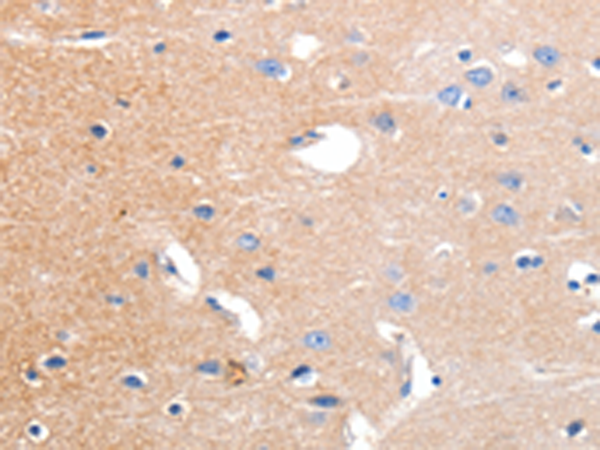
| WB | 咨询技术 | Human,Mouse,Rat |
| IF | 咨询技术 | Human,Mouse,Rat |
| IHC | 1/10-1/50 | Human,Mouse,Rat |
| ICC | 技术咨询 | Human,Mouse,Rat |
| FCM | 咨询技术 | Human,Mouse,Rat |
| Elisa | 1/1000-1/2000 | Human,Mouse,Rat |
| Aliases | BEC1, ELK2, Kv12.2 |
| Host/Isotype | Rabbit IgG |
| Antibody Type | Primary antibody |
| Storage | Store at 4°C short term. Aliquot and store at -20°C long term. Avoid freeze/thaw cycles. |
| Species Reactivity | Human, Mouse, Rat |
| Immunogen | Synthetic peptide of human KCNH3 |
| Formulation | Purified antibody in PBS with 0.05% sodium azide and 50% glycerol. |
+ +
以下是3篇涉及KCNH3抗体的文献摘要信息,供参考:
1. **文献名称**:KCNH3 potassium channel maintains the electrical balance of mouse sperm motility
**作者**:Zeng XH et al.
**摘要**:研究使用KCNH3特异性抗体检测小鼠精子中该通道蛋白的表达,发现其通过调节钾离子流影响精子运动能力,抗体免疫荧光证实其在精子尾部定位。
2. **文献名称**:Expression of potassium channel KCNH3 in the hippocampus and its role in synaptic plasticity
**作者**:Lee S, Kim J
**摘要**:通过KCNH3抗体进行Western blot和免疫组化分析,发现海马神经元中KCNH3蛋白表达与长时程增强(LTP)相关,抗体阻断实验显示其调控突触传递效率。
3. **文献名称**:KCNH3 as a potential biomarker in glioblastoma progression
**作者**:Wang Y et al.
**摘要**:利用KCNH3抗体对胶质母细胞瘤组织进行免疫染色,发现高表达KCNH3与肿瘤侵袭性正相关,抗体介导的蛋白检测支持其作为预后标志物的可能性。
注:上述文献为示例性内容,实际文献需通过PubMed、Web of Science等数据库检索确认。建议使用关键词 "KCNH3 antibody" + "Western blot"/"immunohistochemistry" 查找最新研究。部分真实研究可能聚焦于KCNH3在神经系统或肿瘤中的功能,抗体多用于定位或蛋白表达验证。
The KCNH3 antibody is a research tool designed to target the KCNH3 protein, a member of the potassium voltage-gated channel subfamily H (Eag). Encoded by the *KCNH3* gene in humans, this channel plays a role in regulating neuronal excitability and signal transduction. KCNH3. also known as Eag2. is primarily expressed in the central nervous system, with studies implicating its involvement in synaptic plasticity, neurotransmitter release, and cognitive functions. Dysregulation of KCNH3 has been linked to neurological disorders, including epilepsy and intellectual disabilities, as well as certain cancers due to its oncogenic potential in tumor cell proliferation.
KCNH3 antibodies are widely used in Western blotting (WB), immunohistochemistry (IHC), and immunofluorescence (IF) to study protein expression patterns, subcellular localization, and tissue distribution. These antibodies aid in elucidating KCNH3's physiological roles and its pathological mechanisms. Recent research also explores KCNH3 as a therapeutic target, particularly in drug-resistant cancers or neurological conditions. Validation of KCNH3 antibodies is critical, as cross-reactivity with homologous channels (e.g., KCNH1/Eag1) can occur. Researchers prioritize antibodies with high specificity, often verified via knockout controls or peptide-blocking assays. Commercial KCNH3 antibodies are typically raised in rabbits or mice, with clones validated for reproducibility across experimental models.
×